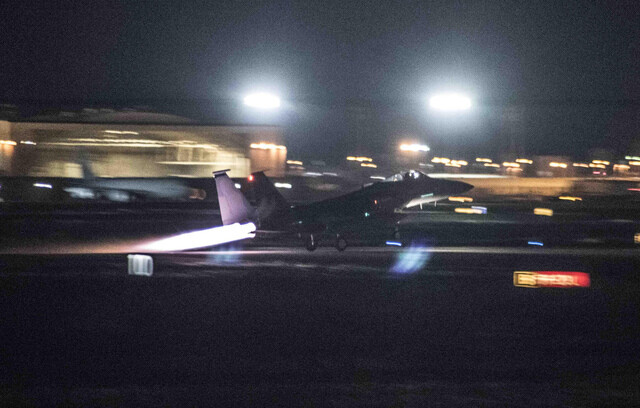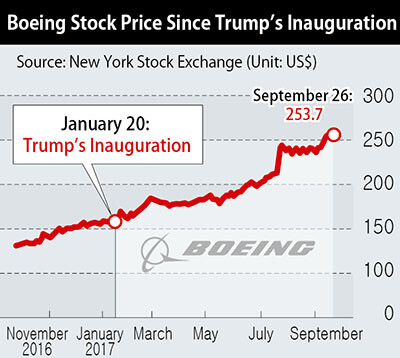hankyoreh
Links to other country sites 다른 나라 사이트 링크
US defense companies see sharp rise in stock values thanks to crisis with North Korea

Defense company shares are considered a prime example of “sinful stocks,” which rise in value during times of terror and tragedy. US defense companies have seen their values skyrocket thanks to a healthy “North Korea bonus.”
On Sept. 18, the US Senate voted 89-9 to approve a bill allocating US$700 billion for national defense for the 2018 accounting year (Oct. 2017–Sept. 2018). The amount was notably higher than the US$640 billion requested in May by the Donald Trump administration. The total defense budget previously allocated by the House of Representatives was nearly equal in scale to the Senate’s, with both houses planning to unify their budget plans. During a Sept. 19 UN General Assembly speech where he sternly denounced North Korea, Trump also promised the US military would “soon be the strongest it has ever been.”

The Senate’s large defense budget hike was spearheaded by Armed Services Committee chairman John McCain. McCain previously argued that the initial defense budget submitted by the administration was inadequate to respond to the North Korean and other threats. If officially set at the level selected by the Senate and House, the defense budget for the 2018 accounting year will have increased by over 10% from the year before.
In terms of specific features, the Senate’s budget includes the purchasing of 28 ICBM interception missiles. After North Korea’s ICBM launch in July, Trump said he planned to increase the missile defense allocation by billions of dollars. The number of F-35 stealth fighters purchased – a new model used in joint exercises with South Korea on the Korean Peninsula – was also increased to 94, up by 24 from the 70 listed in the administration’s plan. Other purchases included one missile destroyer (US$1.9 billion) and 24 F-18 fighters – ten more than in the administration’s plan. Also included was over US$1 trillion for necessary nuclear firepower renewals through 2030.
In addition to the increased defense spending announced by Trump, US defense company stock values have also risen sharply amid growing tensions surrounding North Korea’s nuclear program. Boeing, a leading defense company that produces fighter aircraft, has seen its shares rise by around 60% in value since Trump took office. Top missile manufacturer Raytheon experienced a roughly 25% rise over the same period, while Lockheed Martin and Northrop Grumman saw jumps of around 20% each. All three were much higher than the 12.4% rate of increase for the Dow Jones Industrial Average, considered the leading indicator for the US stock market.
While the rise in Boeing stock values was due in part to anticipated sales of civilian aircraft – an area where Trump has made active efforts – US stock market observers also said rising tensions on the Korean Peninsula were an important factor. Japan’s Mainichi Shimbun newspaper reported on Sept. 27 that many in the US saw the military-industrial complex as “reaping the benefits” from the North Korea situation.
Japan is also ramping up its defense budget to address the North Korea threat. The Japanese Ministry of Defense recently demanded a historically high 2018 budget of 5.2551 trillion yen (US$46.6 billion).
By Cho Ki-weon, Tokyo correspondent
Please direct questions or comments to [english@hani.co.kr]

Editorial・opinion
![[Column] Park Geun-hye déjà vu in Yoon Suk-yeol [Column] Park Geun-hye déjà vu in Yoon Suk-yeol](https://flexible.img.hani.co.kr/flexible/normal/500/300/imgdb/original/2024/0424/651713945113788.jpg) [Column] Park Geun-hye déjà vu in Yoon Suk-yeol
[Column] Park Geun-hye déjà vu in Yoon Suk-yeol![[Editorial] New weight of N. Korea’s nuclear threats makes dialogue all the more urgent [Editorial] New weight of N. Korea’s nuclear threats makes dialogue all the more urgent](https://flexible.img.hani.co.kr/flexible/normal/500/300/imgdb/original/2024/0424/7317139454662664.jpg) [Editorial] New weight of N. Korea’s nuclear threats makes dialogue all the more urgent
[Editorial] New weight of N. Korea’s nuclear threats makes dialogue all the more urgent- [Guest essay] The real reason Korea’s new right wants to dub Rhee a founding father
- [Column] ‘Choson’: Is it time we start referring to N. Korea in its own terms?
- [Editorial] Japan’s rewriting of history with Korea has gone too far
- [Column] The president’s questionable capacity for dialogue
- [Column] Are chaebol firms just pizza pies for families to divvy up as they please?
- [Column] Has Korea, too, crossed the Rubicon on China?
- [Correspondent’s column] In Japan’s alliance with US, echoes of its past alliances with UK
- [Editorial] Does Yoon think the Korean public is wrong?
Most viewed articles
- 1[Column] Park Geun-hye déjà vu in Yoon Suk-yeol
- 2Thursday to mark start of resignations by senior doctors amid standoff with government
- 3Will NewJeans end up collateral damage in internal feud at K-pop juggernaut Hybe?
- 4[Guest essay] The real reason Korea’s new right wants to dub Rhee a founding father
- 5Why Korea shouldn’t welcome Japan’s newly beefed up defense cooperation with US
- 6[Editorial] New weight of N. Korea’s nuclear threats makes dialogue all the more urgent
- 7Kim Jong-un expressed ‘satisfaction’ with nuclear counterstrike drill directed at South
- 8[Column] ‘Choson’: Is it time we start referring to N. Korea in its own terms?
- 9N. Korean hackers breached 10 defense contractors in South for months, police say
- 10‘We must say no’: Seoul defense chief on Korean, USFK involvement in hypothetical Taiwan crisis